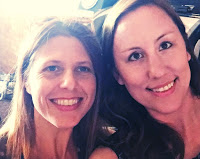Taking my own advice: self-care in the academe
 |
| Selfie with bff, my personal cheerleader |
Today, I have the pleasure of hosting a guest post by Jenny Lendrum. Jenny is a PhD candidate and Rumble Fellow in the department of sociology at Wayne State University in Detroit, MI USA. She is currently conducting an ethnographic study in Detroit, analyzing gendered mechanisms operating in the neighborhood and their effects on the informal economy.
Listen, I’m not so good at self-care at the moment. So, quite naturally, I decided to write a guest blog about it.
My job has something to do with this, I suspect. I am a third year Ph.D student in the Department of Sociology at Wayne State University in Detroit, Michigan, USA. As my research and writing workload has intensified in recent months, I’ve found myself struggling to maintain a healthy work-life balance – specifically, one that facilitates me functioning as both a doctoral student and a human being—at the same time.
Yet I believe there’s a silver lining to these struggles. If there’s ever been an ideal time to reflect on ways I can embark on a more self-nurturing lifestyle, it’s right now!
In the spirit of full disclosure, it is through this blog that I share the following tactics and promise I will take better care of myself moving forward. From acts of nourishing kindness to good, old-fashioned nourishment, here are some things I have found useful in times of crisis. Hopefully, as time goes on, these will become a more regular part of my life—not just things I turn to in times of need.
1. “Positively Present” blog.
I subscribe to this weekly blog that shares various modes of positivity. These include quotes, links to other sites for personal development and enhancement, and music and book suggestions. For years, I have a kept a chalk quote-board in my kitchen. Every week, I find and post a new quote to motivate me. Some weeks are themed around anger while others are framed more around moxie. A colleague of mine, however, prefers brevity; for her, leaving sticky notes with a short, sweet “YES” around the office and/or dwelling helps inspire openness, positivity, and reflection.
2. The Social Component.
I have a natural tendency to isolate myself when I am struggling with challenging writing and analysis—but when I emerge from self-imposed solitude, I rely on the amazing friends, family, and colleagues who continue to support me, even during intense times. Engaging my support system helps me recover faster and easier. Another facet of my social component includes writing at local coffee shops, which helps me escape the quiet of my offices on campus. In addition to the social reprieve I get from random, yet engaging coffee shop conversations, I’m also fortunate to have some amazing creative friends: Adam Pervez and his 2013 happiness Tedx talk; Michele Bond and her yoga practice; Matt Livengood here; and, K.S. Adkins here.
3. Fresh & Local Foods.
Strolling through the local farmer’s markets can be a calming and productive time. Nourishing the body nourishes the mind. Finding peace in the simplicities of a home-cooked meal, made from fresh produce via the local farmer’s market, is time well spent. I find there is something gratifying in washing, chopping, and preparing colorful foods. Coupled with cooking with colleagues or friends, well, even better. Because I spend time collecting data in the field in between working at three offices, on Sundays, I prep my meals for the week, stashing them in mason jars that are travel-friendly.
4. Running.
It is my sanctuary. I realize running isn’t everyone’s bag, but for me, I find time on the road or along muddy trails gives me, and my head, an escape from work. I also use this time to think about my research in different ways. When running with others, talking about random life happenings, work-related problems, and self-care tactics (such as other physical outlets: Bikram yoga and Betty Rocker) become ongoing themes.
5. Napping & Sleeping.
My personal magic number is 7.5-8 hours of sleep per night. The occasional afternoon nap with my cats may feel indulgent but really helps offset the weekly fatigue. Some of the best advice I received in graduate school was a reminder to sleep. Okay, mission accomplished. Next.
6. Et al.
Hmm. While I’d like to write about how making art, meditation, and journaling have helped me maintain a solid work-life balance throughout graduate school, I, in good conscience, cannot. I have realized, over time, that sometimes falling apart is okay. Because, and I don’t know if everyone has similar experiences, maybe that’s just part of the deal with this precarious process. Perhaps learning how to operate in high-stress situations may help better prepare us as scholars in our fields.
Moving Forward.
Disclaimer: this list is not as virtuous as it may seem because I rarely follow all of these practices at any given time. However, now that I’d outed myself, perhaps in the future and throughout the rest of this graduate school experience, I pay better attention to these practices that I have found work well for me at some time or another. I’m more curious about: What works for you? What doesn’t? How do you remind yourself to follow self-care practices in your graduate program program?
